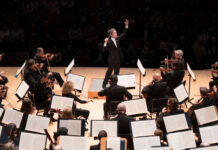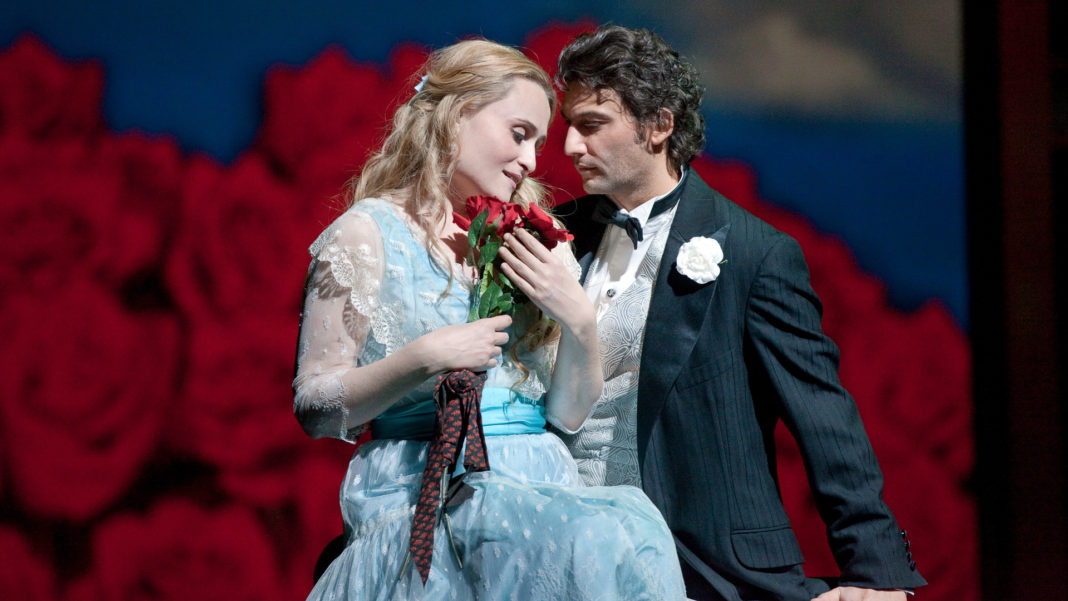Week 36 at the Met celebrates Music Director Yannick Nézet-Séguin. He assumed that role in 2018. He made his Metropolitan Opera debut on New Year’s Eve 2009 conducting a new production of Bizet’s Carmen.
This week’s operas span a period of ten years from 2010-2020 and includes one of my personal favorites, Dialogues des Carmélites by Poulenc on Friday.
Each production becomes available at 7:30 PM EDT/4:30 PM PDT on the Metropolitan Opera website. Every opera remains available for 23 hours. They are heavily promoting their Met Stars Live in Concert series and recently announced the cancellation of the full 2020-2021 season, so you’ll have to go past those announcements and promos to find the streaming productions. Schedules and timings may be subject to change.
If you read this column early enough on November 16th, you might still have time to catch the 2017-2018 season production of The Exterminating Angel by Thomas Adés that concludes last week’s From the Baroque to the Present: A Two-Week Tour of Opera History series.
Here is the line-up for Week 36 at the Met:
Monday, November 16 – Verdi’s Don Carlo
Conducted by Yannick Nézet-Séguin; starring Marina Poplavskaya, Anna Smirnova, Roberto Alagna, Simon Keenlyside, Ferruccio Furlanetto and Eric Halfvarson. This Nicholas Hytner production is from the 2010-2011 season. This is an encore presentation of the production that was made available on April 2nd and August 29th.
Don Carlo had its world premiere in 1867 in Paris. Friedrich Schiller’s play Don Carlos, Infant von Spanien, served as the basis for the libretto by Joseph Méry and Camille du Locle. The opera was originally performed in French. Three months after its debut in Paris, Don Carlo was performed in Italian. First at Covent Garden in London and later in Bologna. It is most frequently performed in Italian.
Don Carlo of Spain and Elisabetta of Valois are betrothed to one another. They have never met. Don Carlo sneaks away to meet this unknown woman. They fall in love. However, their happiness is quickly ruined when Carlo’s father, Filippo, announces that he’s in love with her and she is to be his bride.
Even though she is now his stepmother, Don Carlo tries multiple times to woo Elisabetta away from his father. With the Spanish Inquisition ongoing, the affairs of all three and the appearance of a mysterious monk lead to murder plots, revenge, unrequited love, thievery and more being played out in Verdi’s longest opera.
This was a co-production with the Royal Opera in London and the Norwegian National Opera and Ballet. Royal Opera had first performed this production two years earlier. Hytner may be best known for his role as the Director of the National Theatre in London. His first job directing an opera came in 1979 when he directed Benjamin Britten’s The Turn of the Screw. Don Carlo marked his debut with the Metropolitan Opera. The production was designed by 7-time Tony Award Winner Bob Crowley (An American in Paris; The Coast of Utopia).
Tuesday, November 17 – Gounod’s Faust
Conducted by Yannick Nézet-Séguin; starring Marina Poplavskaya, Jonas Kaufmann, Russell Braun and René Pape. This Des McAnuff production is from the 2011-2012 season. This is an encore presentation of the production that was made available on May 23rd.
Charles Gounod’s Faust had its world premiere in Paris in 1859. The libretto was written by Jules Barbier and Michel Carré who used both Carré’s play Faust et Marguerite and Johann Wolfgang von Goethe’s Faust, Part One as inspiration.
This oft-told story is about a man who sacrifices his soul to the devil, Méphistophélès, in order to maintain his youth and the love of Marguerite.
But you know what happens when you make a deal with the devil…it’s not going to end well.
McAnuff made his Metropolitan Opera debut with this production. He is best known as the director of Jersey Boys and Ain’t Too Proud on Broadway. In his Faust he chose to set this production before and after the dropping of atom bombs in Japan in World War II.
Critics may have been divided over Des McAnuff’s approach, but they were unanimous in their praise of tenor Jonas Kaufmann. Audiences were too. His performance generated a lot of emotion from audiences attending this production.
Wednesday, November 18 – Dvořák’s Rusalka
Conducted by Yannick Nézet-Séguin; starring Renée Fleming, Emily Magee, Dolora Zajick, Piotr Beczała and John Relyea. This revival of Otto Shenk’s 1993 production is from the 2013-2014 season. This is an encore presentation of the production that was made available on April 13th.
Rusalka was Antonín Dvořák’s ninth opera and was based on fairytales. Poet Jaroslav Kvapil wrote the libretto. Rusalka had its world premiere in Prague in 1901.
In essence, this is the same story told in Hans Christian Anderson’s The Little Mermaid. A water sprite, Rusalka, tells her father she has fallen in love with a human prince and wants to join him in his world. He asks her to see a witch who gives her a potion to join the prince, but there are conditions: Rusalka will no longer be able to speak and she loses the opportunity to be immortal. More importantly, if the Prince does not stay in love with her, he will die and Rusalka will be damned for all eternity. This is definitely not a Disney version of the story.
Zachary Woolfe, in his New York Times review, asked a question about this opera and relied on Nézet-Séguin to answer it:
“Dvorak’s Rusalka, about a water nymph doomed by her love for a human prince, is a fairy tale. But is it polite and placid, or savage and strange?
“There’s disagreement about the answer at the Metropolitan Opera, where a decidedly mixed revival of the work opened on Thursday evening. The conductor Yannick Nézet-Séguin, a prime candidate to replace James Levine someday as the Met’s music director, offered a clear vote for savage. He led a fierce orchestral performance, bringing out the symphonic sweep in Dvorak’s score and underlining its most cutting details.”
His comments about Nézet-Séguin proved to be accurate, didn’t they?
Thursday, November 19 – Verdi’s La Traviata
Conducted by Yannick Nézet-Séguin; starring Diana Damrau, Juan Diego Flórez and Quinn Kelsey. This Michael Mayer production is from the 2018-2019 season. This is an encore presentation of the production that was made available on August 28th.
Alexandre Dumas fils (the son of the author of The Three Musketeers) wrote the play, La Dame aux camélias on which Verdi’s opera is based. Francesco Maria Piave wrote the libretto for La Traviata which had its world premiere in Venice in 1853.
In the opera, Violetta, who is in declining health, throws an opulent party. At this party she is introduced to Alfredo by her lover, Baron Douphol. When signs of failing health get noticed by Alfredo, he encourages her to give up her lavish lifestyle. He also admits his great love for Violetta. A love triangle is now in play. From there the opera tells the story of a woman who sacrifices everything to live life on the edge.
There are three interesting things to know about this production: This La Traviata marked the first production with Yannick Nézet-Séguin as the Met Opera’s new music director. As such he persuaded the Met Opera to restore the second intermission that had previously been removed to shorten the length of performances. Lastly, this was a brand new production of Verdi’s beloved opera at the Met. Mayer frames the story, not unlike other directors, as being Violetta’s memories.
Friday, November 20 – Poulenc’s Dialogues des Carmélites
Conducted by Yannick Nézet-Séguin; starring Isabel Leonard, Adrianne Pieczonka, Erin Morley, Karen Cargill, Karita Mattila, David Portillo and Jean-François Lapointe. This revival of John Dexter’s 1977 production, directed by David Kneuss, is from the 2018-2019 season.
Francis Poulenc’s Dialogues des Carmélites had its world premiere in 1957 at La Scala in Milan. The composer wrote the libretto based on a rejected screenplay by Georges Bernanos.
The setting is France during the French Revolution. Blanche de la Force, who is impossibly shy and fragile, wants to retreat from all that is going on in the world and chooses a Carmelite monastery. The prioress tells her that a monastery is a place for devotion to God, not escape from the world. Blanche convinces her to let her stay. What happens to Blanche and the other nuns proves not to be the escape she was hoping for.
Note: The clip and the subsequent paragraph contain plot spoilers. Do not watch or read if you do not know this opera.
Anthony Tommasini, writing in the New York Times, concluded his review of this production by saying, “The final scene, in which the nuns, one by one, walk to the guillotine singing Poulenc’s forlornly beautiful setting of the Salve Regina, felt more horrific than ever. And moving — perhaps because artists of a new generation have taken over this great work, this classic production and, in a way, the Met, starting with Mr. Nézet-Séguin.”
Saturday, November 21 – Puccini’s Turandot
Conducted by Yannick Nézet-Séguin; starring Christine Goerke, Eleonora Buratto, Yusif Eyvazov and James Morris. This revival of the 1987 Franco Zeffirelli production from the 2019-2020 season. This is an encore presentation of the production that streamed on May 21st and September 26th.
Puccini’s opera had its world premiere in 1926 in Milan. The libretto was written by Guiseppe Adami and Renato Simoni. The composer died two years before its premiere and the opera was completed by Franco Alfani.
Set in China, Turandot tells the story of Prince Calaf who has fallen in love with the title princess. She, however, isn’t very interested in him. In order for any man to marry Turandot, he is required to correctly answer three riddles. Should any answer be wrong, the suitor is put to death. Calaf is successful, but Turandot remains opposed to their marriage. He strikes a deal with her that will either lead to their marriage or his death.
Anthony Tommasini wrote in the New York Times about this production:
“Mr. Nézet-Séguin led an exciting and insightful account of Puccini’s Turandot, a revival of Franco Zeffirelli’s glittering, over-the-top and popular 1987 production. The strong cast was headed by the blazing soprano Christine Goerke as Puccini’s icy Princess Turandot, the ardent tenor Yusif Eyvazov as Calaf, and the plush-voiced soprano Eleonora Buratto as Liù. The chorus, during the crowd scenes, sounded superb.”
Sunday, November 22 – Berg’s Wozzeck
Conducted by Yannick Nézet-Séguin; starring Elza van den Heever, Gerhard Siegel, Peter Mattei and Christian van Horn. This William Kentridge production, which had its debut in Salzburg in 2017, is from the 2019-2020 season.
This first opera by Austrian composer Alban Berg is based on an unfinished play of the same name by Georg Büchner. Berg wrote the libretto as well. Wozzeck had its world premiere in Berlin in 1925.
This dark opera tells the story of the title character who is a soldier. During a conversation about decency with his Captain, Wozzeck is ridiculed for having a child out of wedlock. The mother of that child, Marie, is unfaithful to Wozzeck and that betrayal leads to tragic outcomes for them both.
Anthony Tommasini, writing for the New York Times, said of this production, “…few works look at life with more searing honesty than “Wozzeck.” The issues that drive this wrenching, profound opera are especially timely: the impact of economic inequality on struggling families; the looming threats of war and environmental destruction; the rigid stratification — almost the militarization — of every element of society.
“Those themes resonate through the artist William Kentridge’s extraordinary production of Wozzeck, which opened at the Metropolitan Opera on Friday evening. That it arrives as 2020 beckons feels right.”
I wonder what Tommasini knew about the year 2020 would have in store for us all when he wrote this review.
That concludes the Week 36 at the Met celebration of Music Director Yannick Nézet-Séguin. Next week the theme will be family dramas. Of course, this being opera, they won’t be happy families.
Enjoy Week 36 at the Met!
Photo: Marina Poplavskaya and Jonas Kaufmann in Faust. (Photo by Ken Howard/Courtesy Metropolitan Opera)











